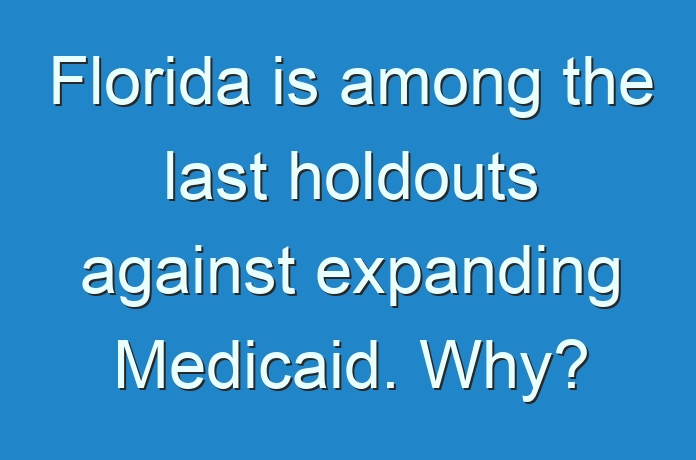
Enough with the Obama excuse, Florida Legislature.
In the past 14 months of this pandemic, we’ve seen that access to healthcare and decent insurance is critical. We’ve seen the virus disproportionately hurt minority and low-income communities, and those inequities have been worsened by the systematic kneecapping of Florida’s own public-health system through years of cuts.
But Republican state lawmakers — who control the Legislature — are continuing to flat-out refuse to help some 964,000 Floridians get insurance by broadening who qualifies for Medicaid because that would mean accepting federal money associated with the Obama administration and its Affordable Care Act.
A financial sweetener offered by the Biden administration this spring as part of the COVID-19 relief package would defray the cost to the state for two years, but the Legislature wouldn’t even consider the idea.
Lawmakers don’t put their callous inaction that plainly, of course. With furrowed brows, they talk of worries about the long-term costs of expansion, of being dependent on federal dollars.
They say they won’t expand Medicaid to more people; they’d rather help them onto “a path to employment, financial resilience and prosperity,” as House Speaker Chris Sprowls, R-Palm Harbor, put it in an Orlando Sentinel article.
Go ahead, tell that to the person with a medical emergency and no insurance: We’re helping you onto a path to prosperity by saddling you with a whopping medical bill you’ll never be able to pay.
No, Republicans in this state don’t want to expand Medicaid because it’s part of the ACA. And the ACA’s nickname? Obamacare.
Florida a holdout
Florida’s anti-expansionists, though, are actually in the minority in the United States these days. Florida is one of just 12 holdout states still refusing to expand Medicaid, the state-federal insurance program for the poor.
Expanding the program was envisioned under the ACA as a way to bridge the gap between those can purchase insurance on ACA exchanges and those who are already covered by Medicaid, primarily pregnant women, poor families and young children.
In Florida, the gap is huge: about 964,000 people with no insurance who could be covered in 2024-23, according to the Florida Policy Institute.
The feds don’t pick up the entire cost for this — but they will pay for 90 percent, forever. And just having more people covered by insurance will likely lower costs for the rest of us. The costs of uninsured care — which usually means using the emergency room without the ability to pay for it — are passed on to consumers and the state.
Over time, most states, even Republican-led ones, have decided to go forward with Medicaid expansion for reasons of financial common sense or because their voters stepped in.
https://www.sootoday.com/classifieds/events/sports-recreation/1676726
https://www.sootoday.com/classifieds/events/sports-recreation/1676727
Not Florida, though. Rick Scott was governor when the issue first arose. And though he was initially for expanding Medicaid — a glimmer of compassion there — he changed his mind later on.
Then came Ron DeSantis. He’s made his career on Trump values and demonizing Democrats.
Both of these Republicans have managed to duck from the knowledge that Obamacare is wildly popular in their state. In 2024, a record 870,000 Floridians bought their insurance through a federal ACA insurance exchange. Miami-Dade County has consistently had some of the highest Obamacare sign-up rates in the country.
ACA popular
The ACA has been law for more than a decade now. It seems like the only people who don’t like it are the politicians in Tallahassee.
The Biden administration, trying to make the last handful of holdout states an offer too good to refuse, has included in the American Relief Plan a provision that allows states like ours to get an extra 5 percent in federal reimbursement money for every person already on Medicaid until 2025. In Florida, that would cover the state’s cost of expanding Medicaid in that time period. The Florida Policy Institute notes that other states have actually saved money when they expanded Medicaid.
But neither Sprowls, the House speaker, nor Senate President Wilton Simpson would entertain the idea during the legislative session. Simpson, a Republican from Trilby, said he worried about “the long-term, recurring costs associated with Medicaid expansion.” DeSantis also remained opposed.
It may be valid to worry about costs down the road, though most analyses have predicted the state would wind up saving money.
Perhaps it would be good for the state to have a public discussion along those lines, exploring the merits of expanding Medicaid. It’s even possible that Sprowls and Simpson and DeSantis actually have the best interests of the state at heart, rather than venal politics. But we doubt it.
And in the end, where does that stiff-necked, Obama-allergic refusal leave the 964,000 people in Florida who might benefit from Medicaid expansion? Back in the emergency room.
Apparently there’s no amount of money from the Biden administration that can buy a dose of compassion for poor people from the Republicans running this state.
“After this icing on the cake is handed to us from the federal government … and we still don’t do it. It’s so sad because we’re playing with people’s lives,” Miami Sen. Annette Taddeo, a Democrat, told the Orlando Sentinel.





